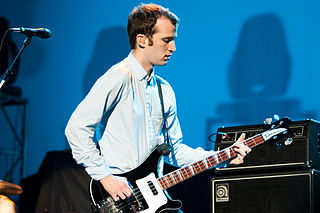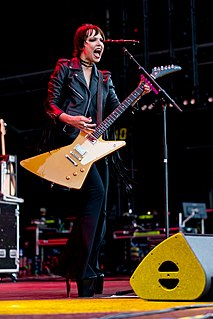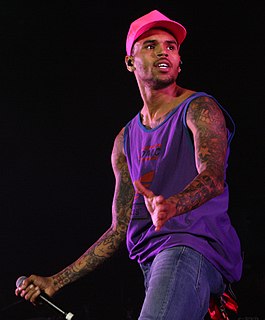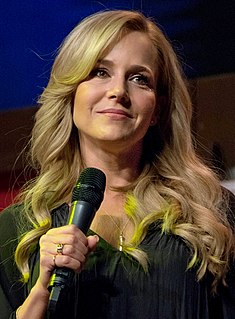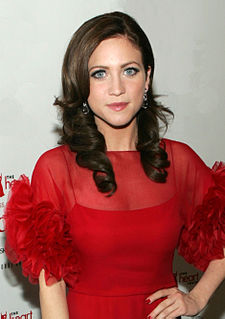A Quote by Chris Baio
I guess in general, because it's such a popular trend in mainstream American pop, that there's been some kind of negative reaction to it. But at the same time, it's a really interesting effect and really interesting texture, and a lot of credit goes to Rostam for producing our music, and all the work that he puts into it, and just trying different things. Ezra did a vocal take, Rostam threw auto-tune on it, and we all liked the way it sounded.
Quote Topics
American
Auto
Because
Been
Credit
Did
Different
Different Thing
Different Things
Effect
General
Goes
Guess
Interesting
Just
Kind
Liked
Lot
Mainstream
Music
Negative
Our
Our Music
Pop
Popular
Producing
Puts
Reaction
Really
Really Interesting
Same
Same Time
Some
Take
Texture
Things
Threw
Time
Trend
Trying
Trying Different Things
Tune
Vocal
Way
Work
Related Quotes
We'd be recording and I'd go down to Greenpoint where Rostam was living and track stuff... It was a busy time. I felt like in general, I was just super psyched with the prospect of getting to be a musician, that it became a thing that I would think about more than I would think about my studies and stuff like that. I still did fine, but it was an interesting time in my life.
I'm really going off of watching John Waters speak one time and I remember he just kind of talked and it was totally interesting. I wanted to hear about his life and how he got started and when did he think he made it, stupid stuff like that. And what his relationship with the mainstream is because he's so far out there, but then he became part of the mainstream in this weird way. He was really funny, though. Yeah, I have to work on my jokes.
I just think that pop music is very interesting in how it can reach so many people. I like that I can tell stories and I just wanted to be heard more, I guess. That's why it's pop, but in my mind I don't really view my music as pop, I don't really view it as anything. I just look at it as a picture, I like visuals.
I take things very seriously, and I give myself time to come down and to ramp up, and it's an inside spiritual journey for me. I feel like acting is a way of feeling your personality, and it's really special. Special to have this kind of effect on people. You can only have that effect if you're really outside of yourself. You can't look at yourself and do what I do at the same time. I have done it that way in the past, but it doesn't really work. I can only soar within the parameters of time, and I use music analogies.
I think that's one of the beautiful things about this genre is that everyone who's in it isn't in it to make a million bucks and be popular, because that's not always our M.O. Really, I think the last time that rock was truly in the mainstream was probably a point in time in the '90s when there was a lot of alternative that was on the pop charts.
I think subjectivity plays into everything. It's unavoidable; you couldn't avoid it if you tried. I think, potentially, a lot more commercial movies, it seems to be that the people making the films are trying to elicit the same reaction. I think a lot of the most interesting work in art and in films are often kind of polarized opinions and affect people in very different ways, which may be less successful commercially, but they elicit a dialogue that's quite interesting.
I tried to stay away from the Euro beats, and not go totally pop. Instead, I wanted to take the Quincy Jones approach. The record pays homage to the Stevie Wonders, the Michael Jacksons, the Sam Cookes. I wanted to put that classic essence of R&B and soul with the new age of music now. There’s a lot of live instruments, and a lot less Auto-Tune. I really wanted to demonstrate my vocal ability, creating the vibe of me singing along with a band.
It's really interesting - I wanted to become an actress when I was young because I wanted to do romantic comedy. And I did a lot of comedies very early on, but then my career took kind of a left turn with Joss Whedon, and I discovered that doing genre work is actually more interesting as an actor, because the given circumstances are more extreme. And it really is creatively more challenging.
To look for some kind of insight or meaning in pop songs is not really - well there's plenty of other places where you should probably look first before you start looking for it in a pop song. I guess it was just because I was really into music as a child, and I wanted it to say more. It was the thing, wasn't it? And now it isn't.
It's really interesting to just look at the career of a musician and a producer that went into many different genres and many different styles and many different places but always breaking the barriers between genres and at some point reinventing himself all along the way but also inventing things at the same time.
I'm really excited to act again because when I started out, there was an innocent sort of perception of the world that was coming though me, and I think now through a lot of experience and life and understanding, I've come full circle to having a purer response to things. So my craft will be really interesting to work from this place because I think acting is about being in tune with yourself - or maybe the struggle to be in tune with yourself.
